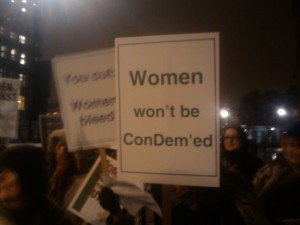First published on Blogcritics
I read Reclaiming the F Word, the much-awaited book by the former editor of the website The F-Word, some months ago when it first came out, indeed even went to the launch in a West End club, but hadn’t found time to write up a review (not enough long train trips recently – at least not ones where I’ve been fit to do any more than sleep).
It wasn’t what I expected – I’d been predicting something more analytical, which tried to present a path forward for feminism and a vision of the future. That’s definitely not what it is.
Rather it’s a snapshot of today – based heavily on a survey of 1,265 feminists, self-described (I was one of them). There are descriptions of types of feminism of today, and surveys of views, but very little in the way of judgements of worth or value.
But provided you take the book for what it is, it’s a valuable work – certainly highly useful as an introduction to modern feminism, and as a guide for those thinking about becoming involved in feminism work but not quite sure where to start. (And with the detailed result presented in an appendix, no doubt invalulable to future historians, and as a source for present-day sociologists.)
It’s also heavy of pointers to further reading, namechecking many of the feminist books and writers of the past decade or so. There’s also plenty of basic facts and figures on women’s status and position, if sometimes they feel a little random,
Adding to the “introduction to feminism” feel,each chapter finishes with a list of possible actions the reader might take, ranged across levels of radicalism and effort.
The focus is slanted towards the UK and the West, but there’s enough discussion of the critical problems of women in the developing world to ensure that any reader new to feminism at least gets a sketch of the international dimension.
But if you’ve been around for a long time, as I have, you won’t find much to surprise you.
It was in the appendix that I found, for me, the most valuable data. The survey question that asked feminists to rank their concerns by importance put inequality in work/home/education top, with well over 600 respondents, and “violence against women” at about 600. “The body”, primarily abortion and reproductive rights was third.
All of these were well above “popular culture” including responses relating to objectification/sexualisation, the issue that I think is consuming far too much time and energy in current feminist efforts.
While I’d class myself, when pushed, as a radical feminist, rather than as a Marxist/socialist one, I think these campaign in attacking the end result of hyper-capitalism are failing to get anywhere near our real problems, which lie in our extreme consumerist culture, for which the use of sex as a commodity to sell pretty well anything at all is merely a logical outcome.
read more »


 About
About